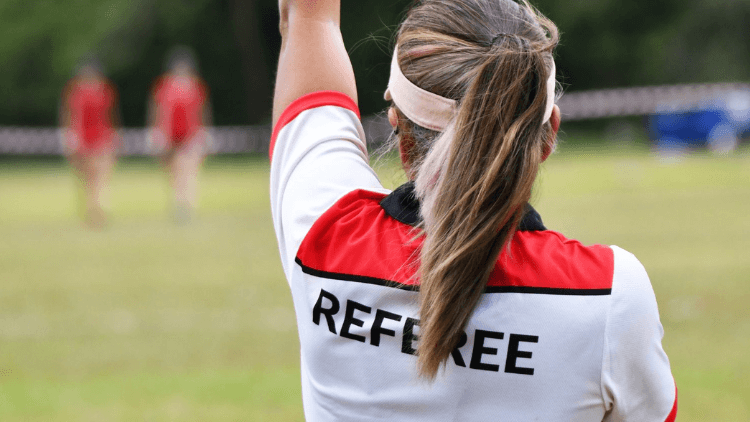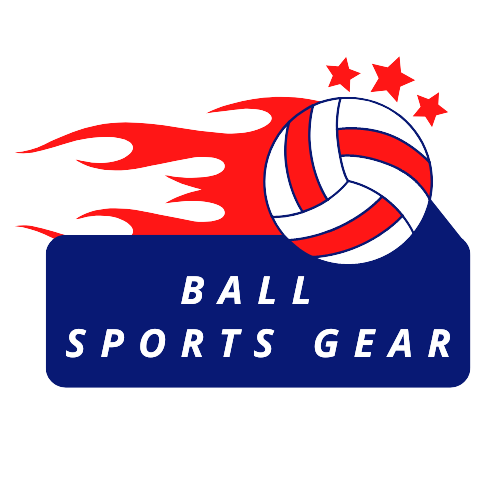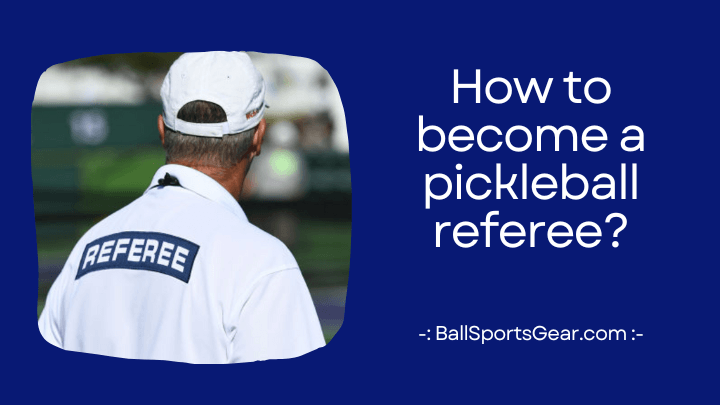Pickleball is a rapidly expanding sport that incorporates aspects of ping-pong, badminton, and tennis. With a net, paddles, and a plastic ball with holes, it is played on a court. All ages and ability levels of players may enjoy and succeed at pickleball since it is simple to learn.
Consider becoming a pickleball referee if you enjoy the game and want to give back to the community. A pickleball referee is a person who officiates a match of the sport and makes sure that it is played fairly and in accordance with the regulations. A pickleball referee’s duties include calling fouls, keeping track of the score, and settling any disputes that arise during play.
Becoming a pickleball referee can be rewarding and challenging. You can improve your knowledge of the game, develop your communication and leadership skills, and meet other pickleball enthusiasts. You can also earn some money or volunteer for a good cause by refereeing at tournaments or events.
But how to become a pickleball referee? What are the steps and requirements? What are the levels of pickleball referee? In this article, we will answer these questions and more.
Follow the Steps to Become a Referee
There are several steps you need to follow to become a pickleball referee. Here is a general overview of the process:
1. Register for a referee training class. You can find online or in-person training classes offered by various organizations, such as the U.S.A. Pickleball Association (USAPA), which is the governing body of pickleball in the United States. You can search for pickleball referee training classes on their website or contact your local pickleball organization for more information. Pickleball referee pay a fee to register for the training class.
2. Study the USAPA officiating handbook. The USAPA officiating handbook is a comprehensive pickleball referee guide to the rules and regulations of pickleball, as well as proper officiating techniques and procedures. You can access the handbook on the USAPA website or request a copy by contacting them directly. You should read through the handbook carefully and familiarize yourself with all the aspects of pickleball officiating.
3. Officiate at a non-sanctioned tournament. A non-sanctioned tournament is a tournament that is not officially recognized or endorsed by the USAPA or any other governing body of pickleball. It is usually organized by local clubs or groups for recreational or practice purposes. You can find non-sanctioned tournaments in your area by searching online or asking around in your pickleball community. You should volunteer to referee at least one match at a non-sanctioned tournament to gain some practical experience and feedback.
4. Take the pickleball referee test and line judge test. The pickleball referee test and line judge test are online tests that assess your knowledge of the rules and regulations of pickleball, as well as your ability to apply them in different scenarios. You can take these tests on the USAPA website after completing your pickleball referee training class. You will need to score at least 80% on both tests to pass them.

5. Meet with a certified referee, who will review your skills. A certified referee is a referee who has completed all the steps and requirements to become an official referee recognized by the USAPA or any other governing body of pickleball. You can find certified referees in your area by searching on the USAPA website or contacting your local pickleball organization. You should arrange to meet with a certified referee, who will observe you refereeing a match and evaluate your skills using a Tiered Referee Rating Form (TRR).
6. Meet the TPP level 2 requirements. TPP stands for Tournament Player Rating, which is a system that assigns ratings to players based on their performance at sanctioned tournaments. TPP level 2 is the minimum rating required to become a certified referee by the USAPA. To meet this requirement, you need to have played at least three sanctioned tournaments within 12 months prior to applying for certification, and have achieved an average rating of at least 3.0.
7. Officiate at an amateur medal match. An amateur medal match is a match that determines the winners of medals (gold, silver, bronze) at an amateur level tournament (such as 3.0, 3.5, 4.0). You can find amateur medal matches at sanctioned tournaments in your area by searching on the USAPA website or contacting your local pickleball organization. You should volunteer to referee at least one amateur medal match to demonstrate your competence and confidence as a referee.
8. Apply for certification. Once you have completed all the steps above, you are ready to apply for certification as a pickleball referee by the USAPA or any other governing body of pickleball. You will need to fill out an application form and submit it along with your referee test and line judge test results, your TRR assessment form, your TPP level 2 verification, and your amateur medal match verification. You will also need to pay a certification fee and agree to the compliance policy and code of conduct of the organization.
Levels of Pickleball Referee
There are different pickleball referee level, depending on your experience and qualifications. Here is a brief description of each referee level pickleball:
Newcomer
A newcomer is a person who is interested in becoming a pickleball referee but has not yet completed any training or testing. A newcomer can learn the basics of pickleball officiating by reading the USAPA handbook, watching online videos, and shadowing other referees.
Level 1 Referee
A level 1 referee is a person who has completed a referee training class, passed the referee test and line judge test, and officiated at least one match at a non-sanctioned tournament. A level 1 referee can referee at non-sanctioned tournaments or events, but not at sanctioned tournaments or events.
Level 2 Referee
A level 2 referee is a person who has met the TPP level 2 requirements, received a positive TRR assessment from a certified referee, and officiated at least one amateur medal match. A level 2 referee can referee at sanctioned tournaments or events, but not at professional or national level tournaments or events.

Certified Referee
A certified referee is a person who has applied for and received certification from the USAPA or any other governing body of pickleball. A certified referee can referee at any level of tournament or event, including professional or national level tournaments or events. A certified referee must renew their certification every two years by completing a recertification process.
Frequently Asked Questions
Pickleball is a paddle sport that combines elements of tennis, badminton, and table tennis. It is played on a court with a net, using paddles and a plastic ball with holes. A referee is needed to ensure that the game is played in a fair and rule-compliant manner, by making calls, monitoring the score, and resolving any conflicts during the game.
To be a pickleball referee, you need to have a good knowledge of the rules and regulations of pickleball, as established by the U.S.A. Pickleball Association (USAPA) or other governing bodies. You also need to have good communication, observation, and decision-making skills, as well as a sense of professionalism and sportsmanship. You should be able to handle tricky situations calmly and confidently, and uphold the integrity of the game.
You can get trained and certified as a pickleball referee by participating in a training and certification program offered by various organizations, such as the USAPA. The USAPA offers online and in-person training for referees and line judges, which involves learning the rules, studying proper officiating techniques, and passing a certification exam. You can also find other training programs by contacting your local pickleball organization or searching online.
Conclusion
How to become a pickleball referee? Becoming a pickleball referee is a great way to enhance your enjoyment of the sport, improve your skills, and contribute to the pickleball community. It is not an easy task, but it is rewarding and fulfilling. If you follow the steps and requirements outlined in this article, you can become a pickleball referee in no time. Good luck and have fun!

